Top 10 Business-Blacklisted iOS Apps
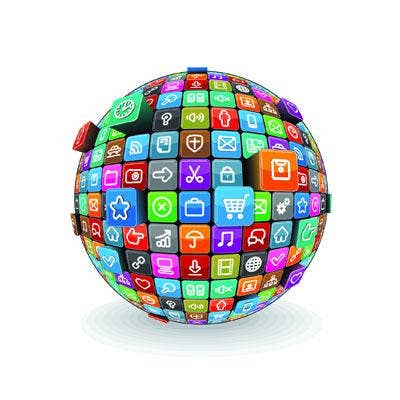
Top 10 Blacklisted iOS Apps In Business
As the BYOD trend continues, more and more businesses are faced with the growing reality of having their workforce go mobile and the potential associated security threats it poses for enterprises. According to a Gartner global survey of CIO executives last month, 38 percent of companies plan on no longer providing mobile work devices to their employees by 2016 -- a number Gartner predicts will rise to 50 percent by 2017. As a result, many businesses have begun "blacklisting" certain apps they feel pose a security risk to corporate information or employee productivity. In a recent Fiberlink survey of over 4,500 corporate- and employee-owned devices, the mobility management solution company found that less than 10 percent of its customers actually had a policy in place regarding banned apps -- but for those companies that did have policies, on average there were around five apps the companies deemed to be corporate no-nos.
Here are the top 10 blacklisted iOS apps from Fiberlink's survey.
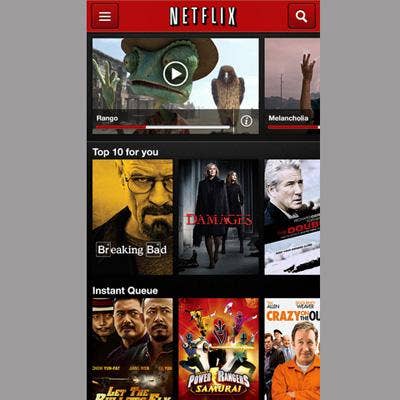
10. Netflix
Netflix, one of the top TV and movie streaming subscription services in the world, is known for making video content available to users at their convenience -- and at the touch of a finger with their mobile app. The app allows Netflix subscribers to stream shows and movies from the company's extensive database from anywhere with network coverage or Wi-Fi. However, streaming uses a lot of bandwidth and data, which is part of the problem with the Netflix app and others like it, said Jonathan Dale, director of marketing at Fiberlink.
"There are two main issues with apps like these: bandwidth consumption on the network and running up data plans," Dale said. "For example, letting your kids watch ... videos during a long drive on vacation can potentially cost the company hundreds of dollars."

9. Hoccer
Hoccer is a file transfer and data exchange application that allows users to share pictures, videos, music and contacts across and between multiple mobile devices and computers by dragging selected content to another device with the touch of a finger, "throwing" it to several people or "catching" it from someone else -- which is part of the problem some businesses have with it, according to Dale.
"[With] apps where you can take a file and put it into a cloud-based server that hosts the data, ... companies are concerned about where corporate data ... is, or where it could end up," Dale said.
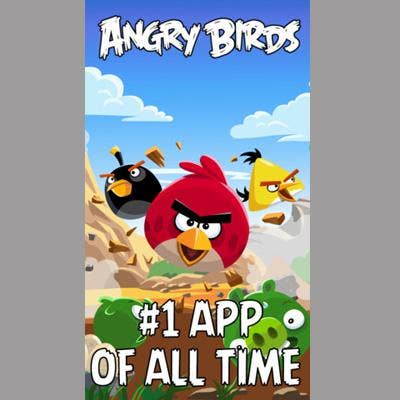
8. Angry Birds
One of the most recognized games for mobile devices, Angry Birds features a cast of feathered creatures (dressed in an assortment of costumes depending on the theme) that users fling at the birds' pig enemies with the swipe of a finger. The subject of multiple spinoffs, including space and Star Wars editions, this game has been responsible for hours of time spent staring at a screen trying to use logic and force to successfully complete each level -- which is time not spent doing work, Dale said.
"Organizations can be thinking there's going to be a lot of time spent playing Angry Birds [instead of working]," Dale said. "If the device is provided by the company, they are very interested in how to maximize ROI and ensure it is being used for its intended purpose."
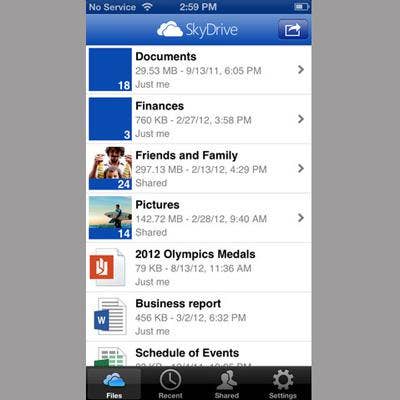
7. SkyDrive
SkyDrive, previously known as Windows Live, is Microsoft's take on cloud storage and allows users to virtually upload files, photos and videos to view and share across multiple devices. Users can see recently used documents, upload content from their mobile device, manage that content on the go and email links to the files in the cloud. Being able to store content virtually may make it easier to share work documents with coworkers, but, according to Fiberlink's Dale, it also makes them more vulnerable.
"Companies ... don't want their data leaking, [so] data sharing apps are a major concern for corporations," Dale said.

6. Pandora
Pandora is a personalized Internet radio service that allows users to create custom "stations" by searching for specific artists or genres and store them when logged into the iOS app, which integrates with the music service online. Through its subscription feature, Pandora users can also utilize the desktop application, have fewer interruptions, no advertisements and a higher quality connection.
Similar to Netflix, Pandora's a bandwidth hog and racks up data. "From a company's perspective, Pandora and other music or movie apps can impact network bandwidth and quickly run up data plans," Dale said. But, that's not the only issue companies have with Pandora. "[It's a question of if] they're contributing to the user and the device being productive," Dale said.
{C}
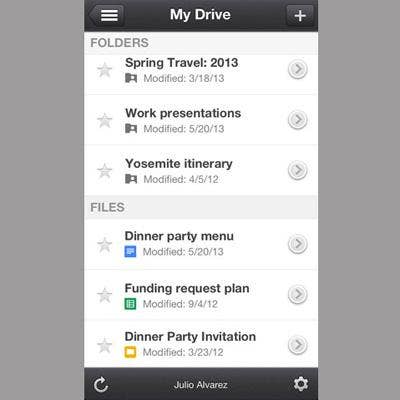
5. Google Drive
Google Drive is the Mountain View, Calif.-based search giant's version of file storage and synchronization in the cloud that allows users to edit, create and share documents, spreadsheets, presentations and photos as well as "pin" files for offline use later. It also creates a place to virtually backup important documents so users can access them if anything gets lost or broken. While Google has a strong reputation in regards to security, Drive is still a cloud application that's vulnerable to leaks or hacking, according to Dale.
"IT admins might feel more secure dealing with OS manufacturers compared to some of the independent ones, but it's not a general statement of 'one is more secure than the other,'" Dale said.
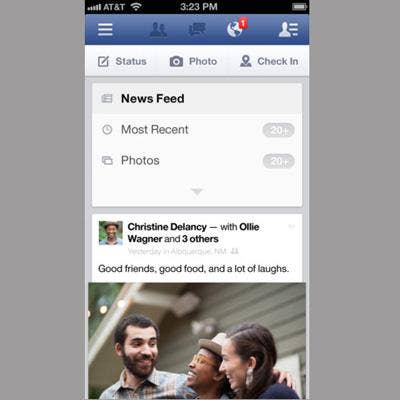
4. Facebook
Facebook is well known for allowing users to connect and share photos, links and ideas with their personal connections on its website or mobile application. While some view Facebook as just an app for play, many businesses have jumped into the digital age, using the social networking giant's site as a regular tool in their marketing and support services toolbox, helping them keep their finger on the pulse of their customer base in real time. But, for those companies that haven't, the networking app could be seen as a distraction, according to Dale.
"I think companies can make the argument that in most cases, it does not lead to a more productive employee," Dale said. "It could potentially lead to a happier employee, but there are some use cases where Facebook and other social networking apps are justifiably blocked."
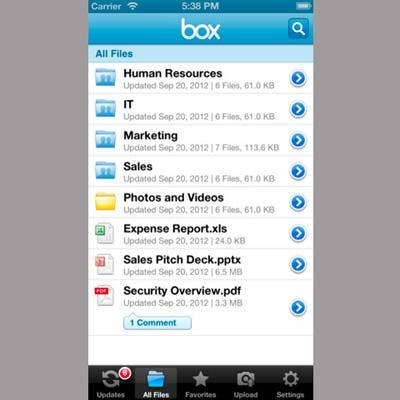
3. BoxNet
BoxNet is an independent, third-party data-sharing cloud application that stores files, from documents to presentations, in the cloud, allowing users to sync, edit and wirelessly stream and print stored files on the go. On certain iOS devices, users can even project presentations through an AV output. While this particular app also allows for data encryption, virtual hosting is always a concern for corporations, according to Dale.
"Six out of the 10 blacklisted apps are cloud applications [because] cloud sharing is and could be a direct risk to corporate data," Dale said.
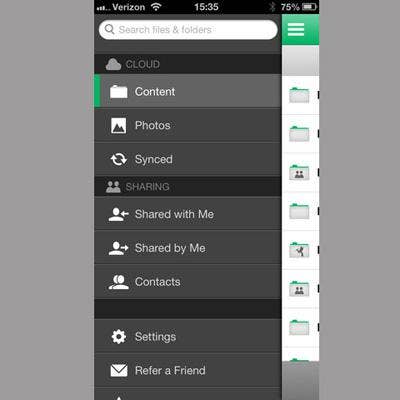
2. SugarSync
SugarSync is another online backup and file-sharing application that offers free cloud storage and synchronization so that users can access their files from any device and also allows for private file sharing through selected invitation. The application's Cloud search function also allows users to quickly find the content filed away in folders.
"Some file sharing and document hosting apps are perceived as a risk, and therefore blocked," Fiberlink's Dale said of all file-sharing, document-hosting-type apps.
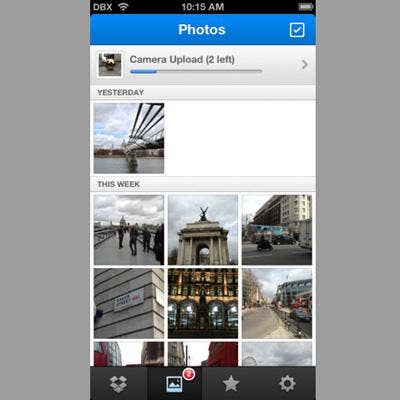
1. Dropbox
Dropbox, the No. 1 most commonly blacklisted iOS app according to Fiberlink's survey, is a free online service that allows users to digitally carry any photo, document or video with them on their mobile device and share between phone, tablets, desktops and on social media sites via its cloud application.
"The top concern for most corporations is knowing that their data is safe, and always in the right hands," Dale said.